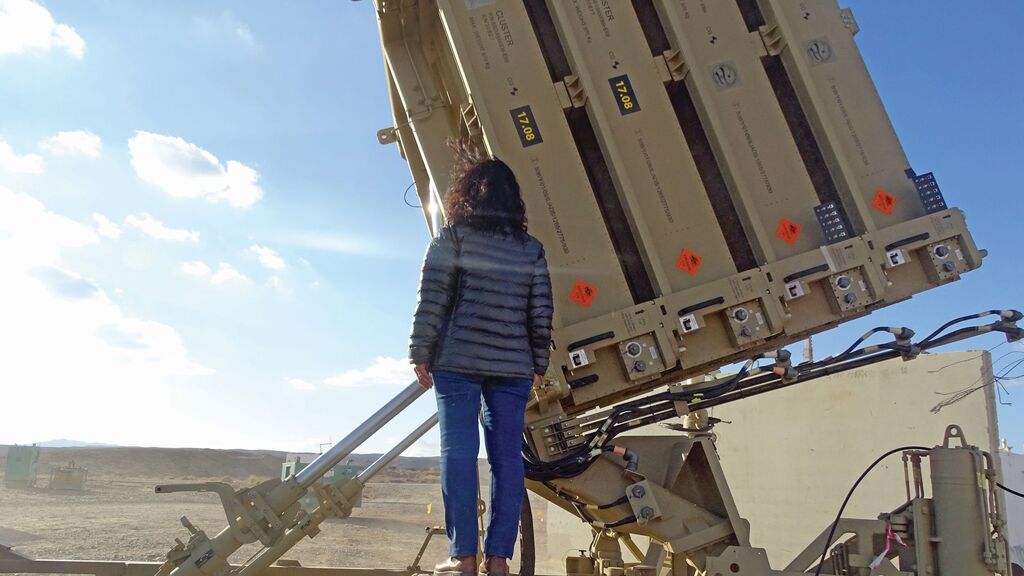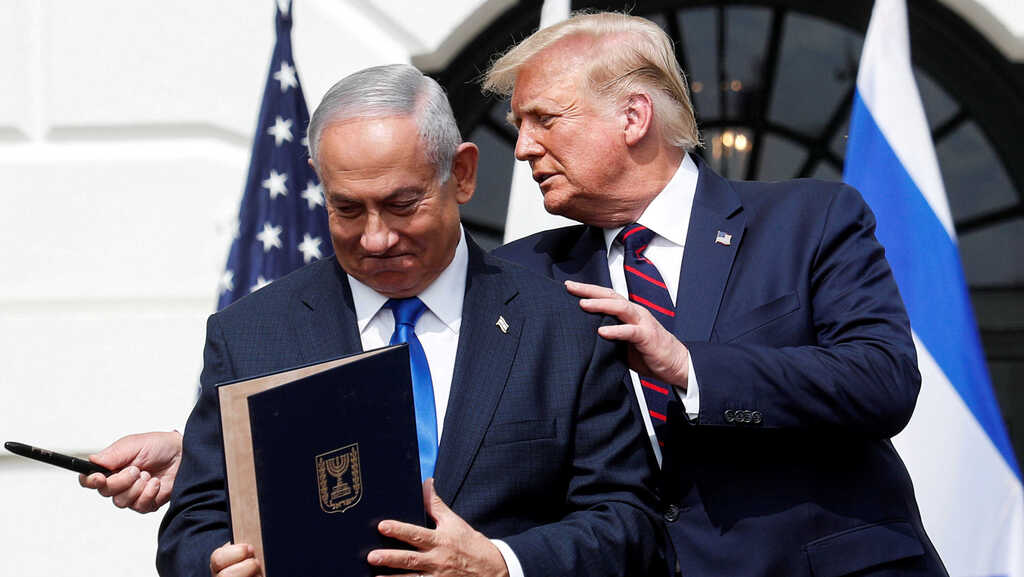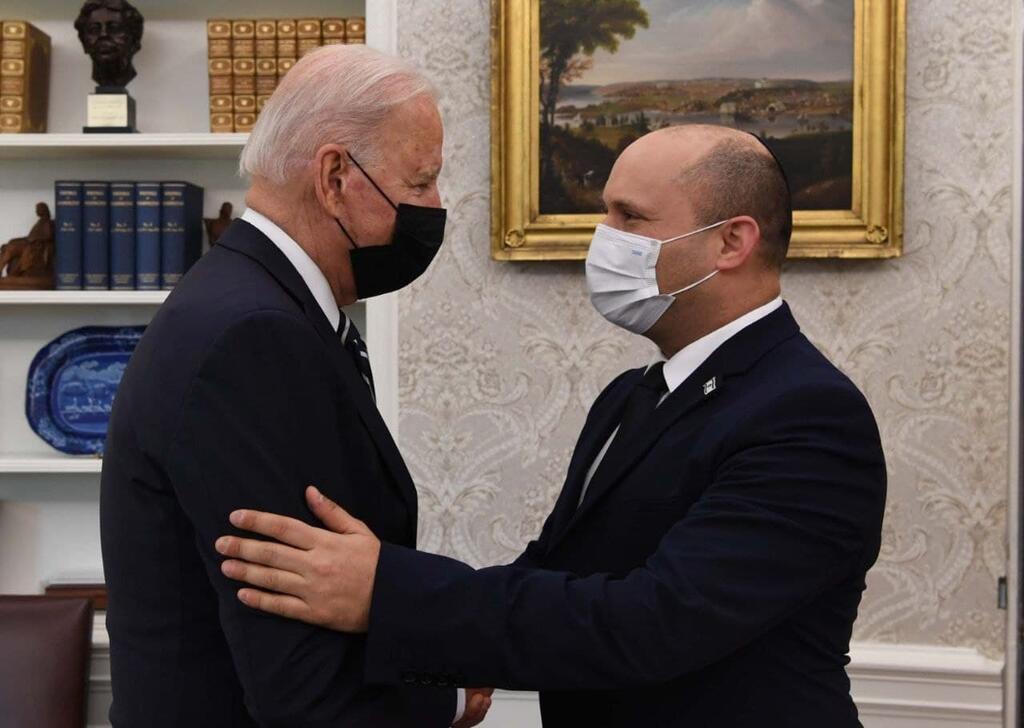Getting your Trinity Audio player ready...
It is safe to assume that Israel will eventually receive the $1 billion in U.S. aid to replenish its Iron Dome missile defense system after the vote in House of Representatives, despite objections from progressive lawmakers in the Democratic Party.
But those who write off the holdup as the result of "radical Democrats flexing their muscles," or as Foreign Minister Yair Lapid called it "the remnants of Benjamin Netanyahu's administration" – are ignoring the bigger picture.
4 View gallery


One of scientists working on Iron Dome stands in front of the defense system
(Photo: Refael)
Netanyahu has indeed caused severe damage to Israel's relations with the Democrats by forging close ties with former president Donald Trump, all the while the U.S. political system is drowning in toxic polarization.
The Jewish state has boasted for years about how it enjoys bipartisan support from the U.S., but the opposite has been the reality for nearly a decade now.
Into this quagmire stepped Netanyahu, brandishing his friendly ties with the most radical wing of the Republican party.
While some mark his speech to the U.S. Congress in 2015 on the Iranian nuclear deal as the breaking point, it was just one more link in a chain of events: His dinner with then-GOP presidential candidate Mitt Romney in 2012 (when he was running against Barack Obama) and his deep ties with his patron American businessman Sheldon Adelson – one of the main financial donors to Barak Obama's Republican competitors in both his election campaigns.
4 View gallery


Then-Prime Minister Benjamin Netanyahu stands with then-U.S. President Donald Trump after signing the Abraham Accords, at the White House
(Photo: Reuters)
The speech itself was perceived as an unacceptable intervention by a friendly head of state, who enjoys regular financial assistance that exceeds the aid the U.S. transfers to many other countries in the world, which is a major issue in American foreign policy.
In doing so, Netanyahu inflicted heavy damage to Israel's relations with the Democratic Party, and no less so with American Jewry, most of whom support the party.
But as stated earlier, the issue did not stem only from Netanyahu's attitude or progressive lawmaker's alleged anti-Israel sentiments.
Ahead of the last U.S. presidential elections, a known Jewish organization asked me to hold a Zoom meeting with hundreds of Democratic representatives, among them members of the party's centrist wing.
4 View gallery


Palestinian students and teachers wait for Israeli soldiers to allow them to cross a military checkpoint near the Jewish settlement of Beit Hadasa in the West Bank city of Hebron
(Photo: AFP)
The issue of Israel annexing territories in the West Bank, primarily in the Jordan Valley, was on everybody's mind, and there was a lively debate among Democrats as to whether the party's platform should be used to talk about annexation and how it might affect the military aid money that Israel receives.
The annexation did not happen and neither did the scrapping of funds to Israel - but it is an example to a much broader problem, which does not change even when the current prime minister is received to fanfare in the White House.
In many Democratic circles, which include many American Jews and especially their younger generation, Israel has long ago lost the image of the small and brave nation surrounded on all sides by larger enemies who want to annihilate the only democracy in the Middle East.
In their eyes, Israel is the only Western country that holds an entire nation under occupation, and does so while being fueled by nearly $4 billion of American taxpayer money.
For them, the gap between "Black Lives Matter" and "Palestinian Lives Matter" is much narrower than we are willing to admit.
U.S. President Joe Biden's administration has no interest in meddling in Middle Eastern affairs, as his speech to the UN General Assembly earlier this week demonstrated.
4 View gallery


Prime Minister Naftali Bennett meeting with U.S. President Joe Biden at the White House
(Photo: GPO)
But Naftali Bennett's government needs to understand that the mantra of "well, at least we are not Netanyahu," is not enough – neither for internal affairs nor for continued ties with the U.S.
As for the aid, one day we will have to debate why a country with an annual GDP of a trillion and a half shekels and a military budget over 80 billion shekels still needs to continue and beg for money from countries across the ocean.
As long as Israel continues to receive it and base the defense of the Israeli citizens around it, we must also be attentive to what is going on in Congress. Sooner or later, "the Netanyahu excuse" will become void.
Ofer Shelah is a former member of Knesset, who served on the Foreign Affairs and Defense Committee and related subcommittees; he is currently a senior research fellow at the Institute for National Security Studies (INSS) at Tel Aviv University

